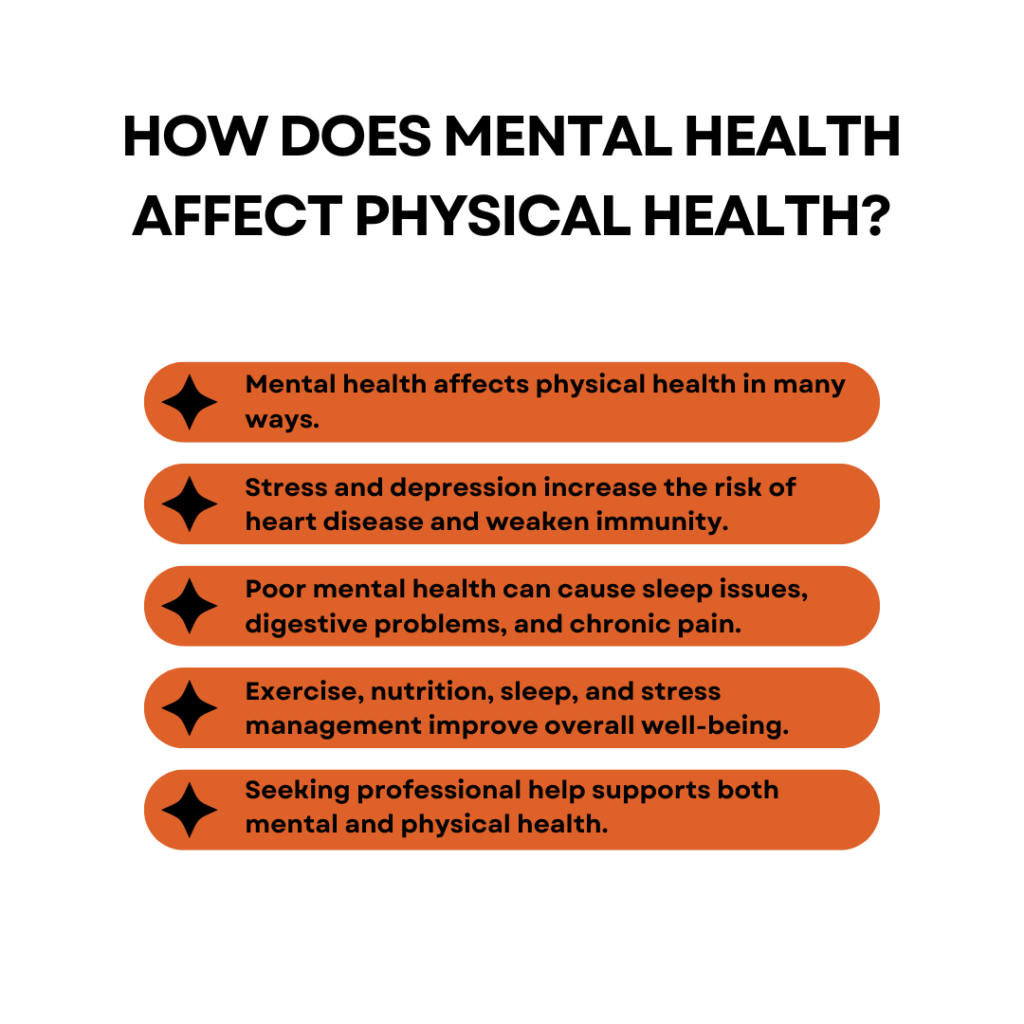
How Does Mental Health Affect Physical Health?
Mental health and physical health are deeply connected. The way a person feels emotionally influences their body’s functions, and in turn, physical health affects mental well-being. While these two aspects of health are often treated separately, scientific research continues to reveal their strong relationship. Understanding how mental health affects the body can help individuals make informed decisions about their overall well-being and take proactive steps to enhance their quality of life.
The Link Between Mental and Physical Health

Studies show that poor mental health can contribute to various physical illnesses. Chronic stress, anxiety, and depression have been linked to conditions such as heart disease, diabetes, and weakened immune function. Conversely, maintaining good mental health supports better physical resilience, faster recovery from illnesses, and a lower risk of chronic diseases. The mind and body work in unison, influencing each other in ways that are both subtle and profound.
Read also : Productivity vs Efficiency – What’s the Difference?
Mental Health and the Cardiovascular System

Chronic stress and depression increase the risk of cardiovascular diseases. A study published in The Lancet Psychiatry found that individuals with severe mental health conditions are more likely to develop high blood pressure and heart disease. Stress triggers the release of cortisol and adrenaline, hormones that, when elevated over long periods, contribute to inflammation, arterial damage, and an increased risk of heart attacks.
Furthermore, individuals experiencing chronic anxiety may develop unhealthy coping mechanisms, such as smoking, excessive alcohol consumption, or overeating, which further increase cardiovascular risk. Poor mental health can also discourage individuals from seeking necessary medical care, delaying diagnoses and treatment of heart conditions.
Read also : Why Stress Is Good
Get your free E-book
Over 50 Tips and Tricks to Radically Change Your Life in 6 Months
The Impact on the Immune System

Mental health influences the immune system’s ability to fight infections. Research from the American Psychological Association (APA) indicates that prolonged stress weakens immune defenses, making individuals more susceptible to colds, flu, and other illnesses. Depression and anxiety have been associated with increased inflammation in the body, which plays a role in conditions such as rheumatoid arthritis and autoimmune disorders.
Chronic stress disrupts the production of white blood cells, the body’s primary defense mechanism against infections. As a result, people experiencing long-term mental distress may find themselves more frequently battling infections and taking longer to recover. Additionally, studies suggest that stress and depression can exacerbate pre-existing autoimmune diseases by amplifying inflammatory responses, leading to more severe symptoms.
Read also : Mental Health Is Not a Joke
Mental Health and Sleep Disorders

People with anxiety, depression, or other mental health disorders are more likely to experience sleep problems, including insomnia and sleep apnea. The National Sleep Foundation reports that 50% to 80% of individuals with mental health conditions suffer from sleep disturbances. Poor sleep quality, in turn, exacerbates mental health symptoms, creating a vicious cycle that affects daily functioning and long-term health.
The physiological consequences of sleep deprivation include weakened immunity, heightened stress hormone production, and impaired cognitive function. When sleep is consistently disrupted, individuals may experience mood swings, memory lapses, and reduced decision-making ability, further impacting their mental health. Addressing sleep issues through lifestyle adjustments and professional guidance can significantly improve overall well-being.
Read also : The Difference Between Habit and Addiction
Effects on Digestive Health

The gut and brain communicate through the gut-brain axis, a complex network linking the nervous system and digestive tract. Stress and anxiety can disrupt digestion, leading to irritable bowel syndrome (IBS), acid reflux, and other gastrointestinal issues. A study in Gastroenterology found that patients with chronic digestive problems often exhibit high levels of psychological distress, highlighting the deep connection between mental and digestive health.
Stress-induced digestive issues can result from hormonal imbalances that alter gut motility and microbiome composition. Prolonged stress can lead to increased production of stomach acid, aggravating conditions like gastritis and ulcers. Individuals with anxiety or depression may also experience appetite fluctuations, further complicating digestive health.
Read also : How to Be More Confident: 10 Tips That Work
The Relationship Between Mental Health and Chronic Pain

Depression and anxiety are common in individuals with chronic pain conditions, such as fibromyalgia, migraines, and arthritis. The brain processes both emotional distress and physical pain through overlapping pathways. A study in Pain Medicine found that individuals with untreated depression experience higher pain sensitivity and lower pain tolerance, making chronic conditions more difficult to manage.
Persistent pain can contribute to mental health decline, leading to increased stress, social withdrawal, and a reduced ability to engage in daily activities. This cycle of pain and emotional suffering can be broken through targeted interventions such as cognitive-behavioral therapy (CBT), physical therapy, and mindfulness-based stress reduction techniques.
Read also : How to Overcome Challenges to Goal Achievement
Mental Health and Weight Management

Mental health influences eating habits and metabolism. Depression and stress can lead to emotional eating, unhealthy food choices, and weight gain. Conversely, some individuals experience appetite loss and unintentional weight loss due to anxiety or depressive disorders. The Centers for Disease Control and Prevention (CDC) report that obesity rates are higher among individuals with poor mental health, increasing the risk of diabetes and cardiovascular disease.
Unhealthy eating behaviors linked to stress include consuming high-fat, high-sugar foods that provide temporary comfort but contribute to long-term health complications. Additionally, poor mental health can reduce motivation to engage in physical activity, further exacerbating weight-related issues. Implementing stress management techniques and structured meal planning can improve both mental and physical health.
Read also : How to Increase Productivity at Work
Get your free E-book
Over 50 Tips and Tricks to Radically Change Your Life in 6 Months
The Link Between Mental Health and Substance Use

Individuals struggling with mental health issues are more likely to use tobacco, alcohol, or drugs as coping mechanisms. The National Institute on Drug Abuse (NIDA) reports that people with mental health disorders are twice as likely to develop substance use disorders. While these substances may provide temporary relief, they often worsen mental health symptoms and contribute to long-term physical health complications.
Substance use affects brain chemistry, exacerbating symptoms of anxiety and depression. Over time, reliance on substances can lead to addiction, making it even more challenging to address underlying mental health conditions. Seeking professional treatment for both mental health and substance use disorders is crucial to breaking this harmful cycle.
Read also : How to Discipline Your Mind
Strategies to Improve Both Mental and Physical Health

Regular Exercise

Exercise benefits both mental and physical health. Engaging in regular physical activity releases endorphins, reduces stress, and improves mood. A study in JAMA Psychiatry found that even moderate exercise, such as a daily 30-minute walk, lowers the risk of depression and anxiety.
Physical activity also strengthens the cardiovascular system, enhances immune function, and supports healthy weight management. Finding enjoyable forms of exercise can increase long-term adherence and overall well-being.
Read also : Study Hack: Your Brain’s Cheat Code
Balanced Nutrition

A well-balanced diet supports brain function and physical health. The Mediterranean diet, rich in fruits, vegetables, lean proteins, and healthy fats, has been linked to lower rates of depression and improved cognitive function. Nutrients such as omega-3 fatty acids, B vitamins, and antioxidants play a key role in mental well-being.
Avoiding excessive processed foods and refined sugars can stabilize mood and energy levels, creating a foundation for lasting mental and physical health improvements.
Read also : How habit works
Quality Sleep

Adequate sleep is essential for both mental and physical health. The Sleep Research Society recommends 7-9 hours of sleep per night for adults. Establishing a bedtime routine, limiting screen time before bed, and managing stress can improve sleep quality and overall well-being.
Stress Management Techniques

Practicing mindfulness, meditation, and deep breathing exercises helps reduce stress and improve emotional health. A study in Psychosomatic Medicine found that mindfulness-based stress reduction techniques lower cortisol levels and enhance immune function.
Get your free E-book
How to radically change your life in 6 months
Seeking Professional Help

Mental health treatment, including therapy and medication, can improve both psychological and physical well-being. Cognitive-behavioral therapy (CBT) has been proven effective in reducing symptoms of anxiety, depression, and stress-related illnesses. Accessing mental health services early can prevent more severe health complications.
Conclusion
Mental and physical health are closely intertwined. Poor mental health increases the risk of chronic diseases, weakens the immune system, and disrupts essential bodily functions. Prioritizing mental well-being through healthy lifestyle choices, stress management, and professional support leads to better overall health. Addressing mental health concerns is not only beneficial for the mind but also for the body, reinforcing the need for a holistic approach to health care.
If you want to go further, here’s a guide. To get it, click here!




